中考英语二轮语法专项复习 第03讲冠词 课件
文档属性
| 名称 | 中考英语二轮语法专项复习 第03讲冠词 课件 |
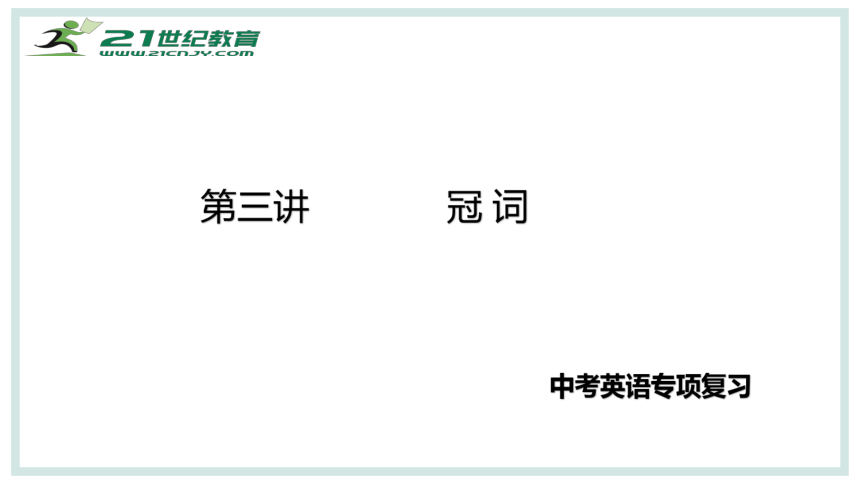
|
|
| 格式 | pptx | ||
| 文件大小 | 2.4MB | ||
| 资源类型 | 试卷 | ||
| 版本资源 | 鲁教版 | ||
| 科目 | 英语 | ||
| 更新时间 | 2023-11-21 00:00:00 | ||
图片预览

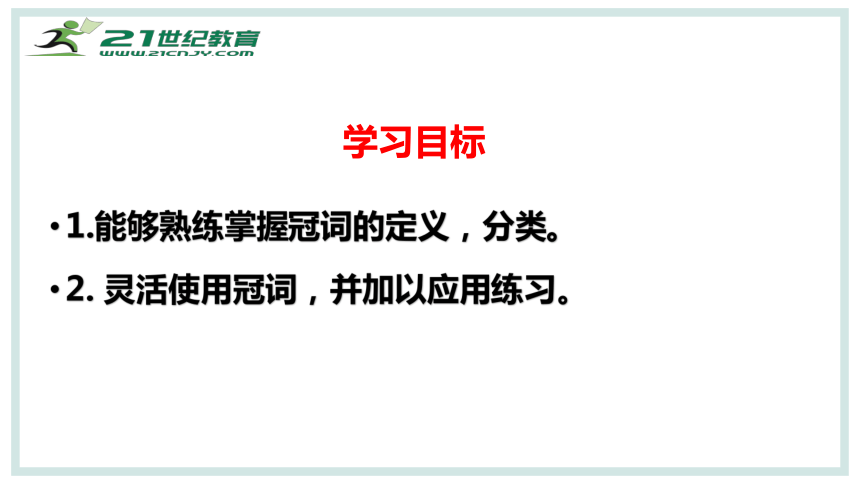
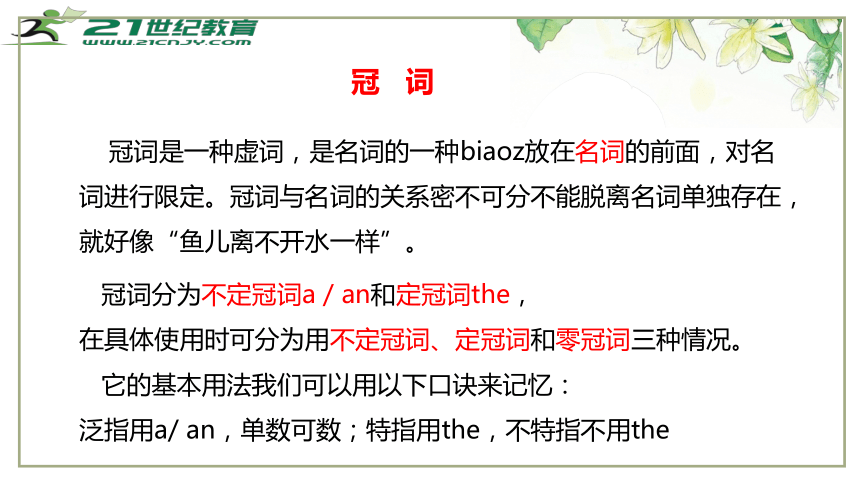
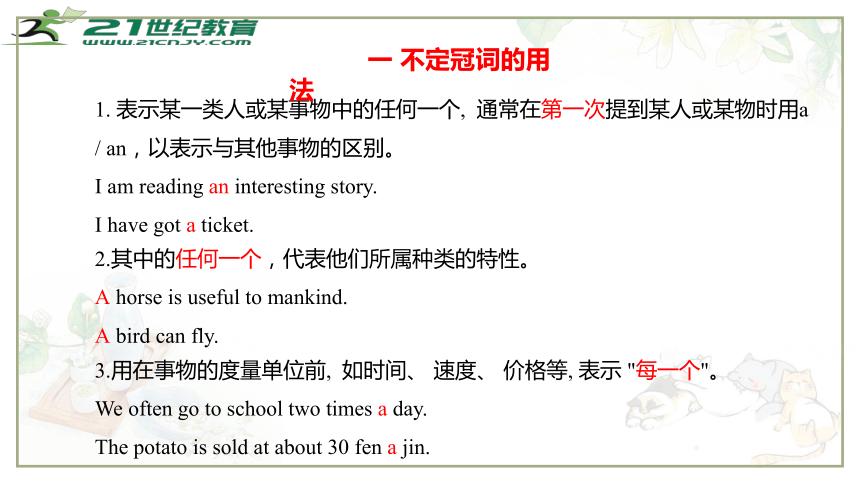
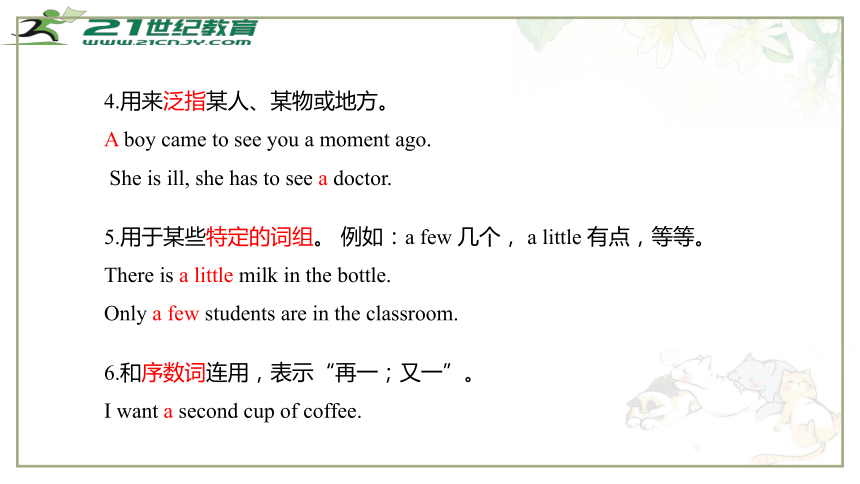
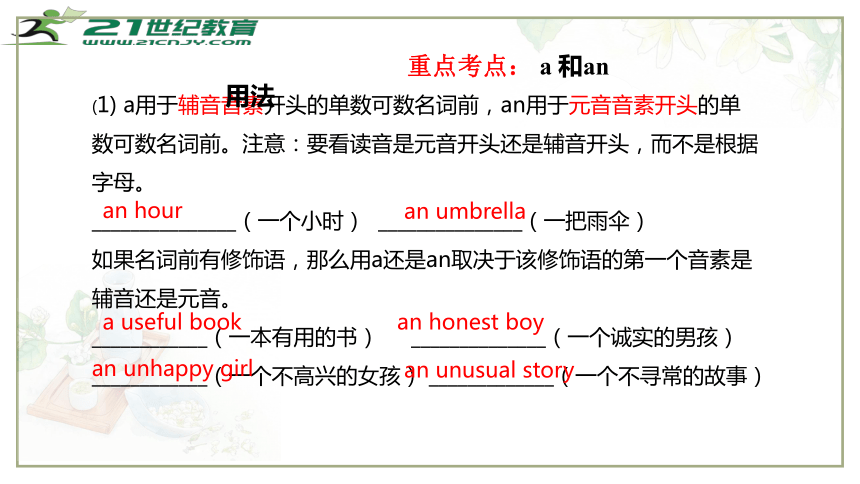
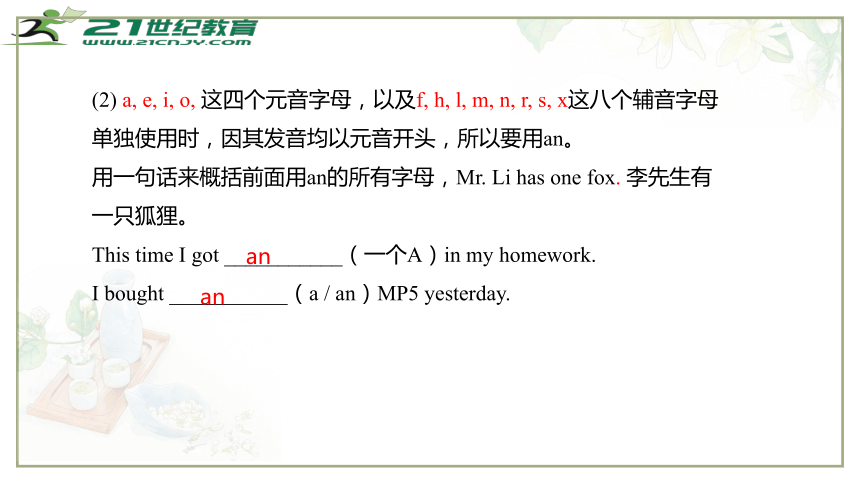
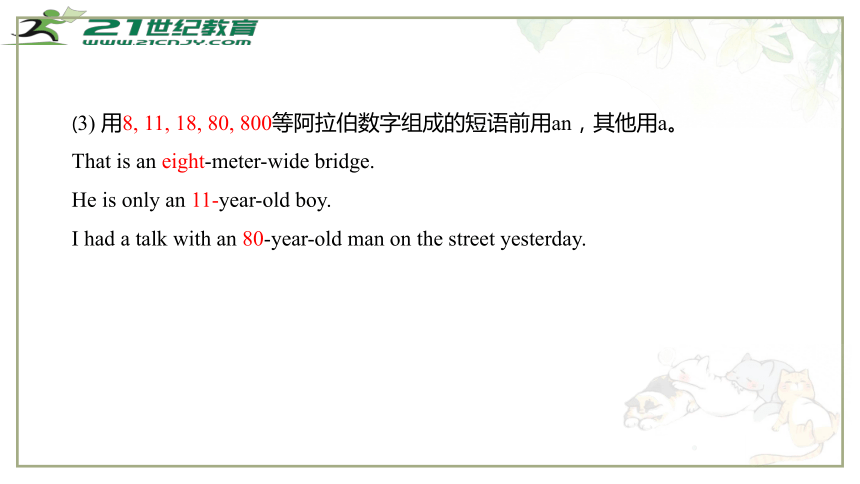
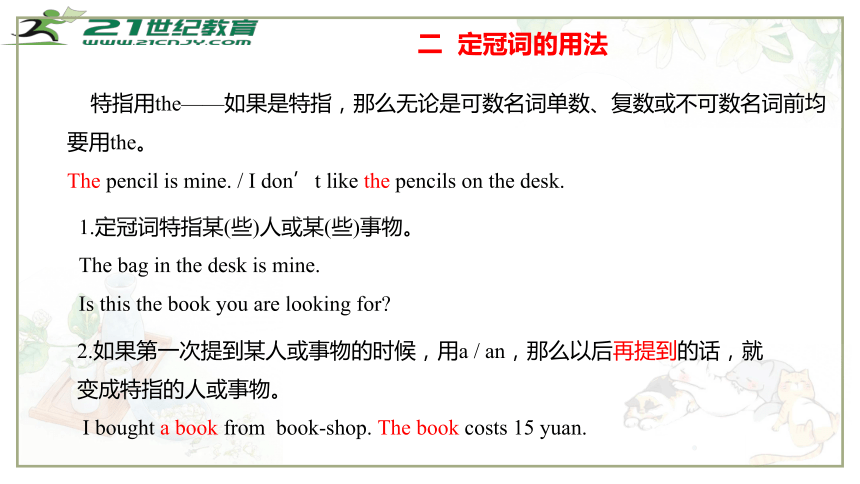
文档简介
(共29张PPT)
第三讲 冠 词
中考英语专项复习
1.能够熟练掌握冠词的定义,分类。
2. 灵活使用冠词,并加以应用练习。
学习目标
冠 词
冠词是一种虚词,是名词的一种biaoz放在名词的前面,对名词进行限定。冠词与名词的关系密不可分不能脱离名词单独存在,就好像“鱼儿离不开水一样”。
冠词分为不定冠词a / an和定冠词the,
在具体使用时可分为用不定冠词、定冠词和零冠词三种情况。
它的基本用法我们可以用以下口诀来记忆:
泛指用a/ an,单数可数;特指用the,不特指不用the
1. 表示某一类人或某事物中的任何一个, 通常在第一次提到某人或某物时用a / an,以表示与其他事物的区别。
I am reading an interesting story.
I have got a ticket.
一 不定冠词的用法
2.其中的任何一个,代表他们所属种类的特性。
A horse is useful to mankind.
A bird can fly.
3.用在事物的度量单位前, 如时间、 速度、 价格等, 表示 "每一个"。
We often go to school two times a day.
The potato is sold at about 30 fen a jin.
4.用来泛指某人、某物或地方。
A boy came to see you a moment ago.
She is ill, she has to see a doctor.
5.用于某些特定的词组。 例如:a few 几个, a little 有点,等等。
There is a little milk in the bottle.
Only a few students are in the classroom.
6.和序数词连用,表示“再一;又一”。
I want a second cup of coffee.
0
(1) a用于辅音音素开头的单数可数名词前,an用于元音音素开头的单数可数名词前。注意:要看读音是元音开头还是辅音开头,而不是根据字母。
_______________(一个小时) _______________(一把雨伞)
如果名词前有修饰语,那么用a还是an取决于该修饰语的第一个音素是辅音还是元音。
____________(一本有用的书) ______________(一个诚实的男孩)
____________(一个不高兴的女孩) _____________(一个不寻常的故事)
重点考点: a 和an用法
an hour
an umbrella
a useful book
an honest boy
an unhappy girl
an unusual story
0
(2) a, e, i, o, 这四个元音字母,以及f, h, l, m, n, r, s, x这八个辅音字母单独使用时,因其发音均以元音开头,所以要用an。
用一句话来概括前面用an的所有字母,Mr. Li has one fox. 李先生有一只狐狸。
This time I got ___________(一个A)in my homework.
I bought ___________(a / an)MP5 yesterday.
an
an
0
(3) 用8, 11, 18, 80, 800等阿拉伯数字组成的短语前用an,其他用a。
That is an eight-meter-wide bridge.
He is only an 11-year-old boy.
I had a talk with an 80-year-old man on the street yesterday.
特指用the——如果是特指,那么无论是可数名词单数、复数或不可数名词前均要用the。
The pencil is mine. / I don’t like the pencils on the desk.
二 定冠词的用法
1.定冠词特指某(些)人或某(些)事物。
The bag in the desk is mine.
Is this the book you are looking for
2.如果第一次提到某人或事物的时候,用a / an,那么以后再提到的话,就
变成特指的人或事物。
I bought a book from book-shop. The book costs 15 yuan.
3. 定冠词用于表示世界上独一无二的事物或用于自然界现象或方位名词之
前。这些事物当然是特指的事物,不可能有两个以上。
the sun the moon the earth the sky the world the winter night
The sun is bigger than the moon.
I can see a bird in the sky.
4.定冠词与单数名词连用, 也可以表示这一类人或事物
The dog is not too danger.
The umbrella in the shop is very cheap in this season.
0
5. 定冠词与形容词连用, 可表示某一类人或事物。可看作是省略了名词的用法。
The wounded were brought to the hospital.
He always helps the poor.
【注意】the 用在姓名复数之前, 表示一家人。
The Greens are very kind to us.
The Whites like the classic music.
0
6.其它需要用the 的情况:
(1) 用在序数词, 形容词最高级和表示方位的名词前。
This is the biggest city in China I have ever visited.
I saw a plane coming from the east.
He is the last one to help me.
(2) 用在演奏乐器的名称和文艺活动、运动场所的名称前。
The little girl likes to play the violin.
They are going to the cinema tonight.
0
(3) 用在报刊, 杂志的名称的名词之前。
I am reading the China Daily now.
The Peking Review is on the desk.
(4) 用在部分江河、 海洋、 山脉、群岛的名称之前。
the Pacific Ocean
the Himalayas
不特指不用the——不特指则不用the,包括泛指的可数名词单数前用a / an,泛指的可数名词复数前不用冠词,泛指的不可数名词前也不用冠词三种情况。
I like monkeys. / I don’t like bread.
1.“人名、地名、国名”等或“街名、广场名、公园名、大学名”等专有名词
前通常不用冠词:
(1) Mary; Tom; Jim; Miss Li; Mr. Zhang; Lei Feng
(2) Beijing; Shanghai; London; Paris
(3) England; China; Germany; South Africa
三 零冠词的用法
但如后有定语修饰表特指,需加定冠词:
(1)He is no longer the Brown we knew ten years ago.
(2) The Beijing of today is different from what it was.
(3) Wang Fu Jing Street 王府井大街; Naking Road 南京路
(4) Tian An Men Square 天安门广场
(5) Pei Hai Park 北海公园; Hyde Park海德公园
(6) Beijing University 北京大学; Zhejiang University 浙江大学
但也可说:the University of Beijing; the University of Zhejiang
2. 正职或表示独一无二的官衔,职位,称号的专有名词作表语、补语、介
词的宾语或同位语时,前一般不加冠词:
The guards took the American to General Lee.
Lincoln, president of the United States, was murdered in 1864.
We made him head of our class.
但这个名词后有短语“of”时,有时也可加“the”:
He is (the) captain of the basketball team.
They elected him president of the U.S.
如不是独一的要加不定冠词:
She is a teacher of English in our school.
3. “个体名词复数”表泛指一类人或事物时不用冠词:
(1) My mother and father are school teachers.
(2) Horses are useful animals.
4. “抽象名词、物质名词”表示一般概念时,通常不加冠词:
(1) Failure is the mother of success.
(2) Man cannot live without water.
但如后有定语修饰表特指,需加定冠词:
(1) The news that you heard is true.
(2) The water in this well is fit to drink.
5. “节日、季节”等名词前不用冠词:
(1) New Years’ Day 新年,元旦 Women’s Day 妇女节
Labour Day 劳动节 Children’s Day 儿童节
April Fools’ Day 愚人节 National Day 国庆节
但我国的节日前用定冠词:
the Spring Festival 春节 the Mid-Autumn Festival 中秋节
(2) in spring (summer, autumn, winter)
Winter has come, is spring still far away
但如后有定语修饰表特指,需加定冠词:
in the spring of 1948 一九四八年的春季
6. “年份、月份、星期、日期”等名词前不用冠词:
in 1988; in August; on Thursday; on August 8th
We go to school from Monday to Friday.
7. “一日三餐”等名词前不用冠词:
have breakfast (lunch, supper)
I have breakfast at 7 every day.
但如前面有形容词修饰,需用不定冠词;后面有定语修饰,需用定冠词:
He had a big breakfast today.
The breakfast he had today was good.
8. 球类运动和娱乐运动的名称前,不用冠词:
(1) play football (basketball; volleyball; tennis; tennis ball)
(2) play chess
9. 序数词作副词时,前不用冠词:
He came first in the race.
Work must come first.
10. 一些固定词组中:
go to bed, go to school, by bus, at night
11. 当“bike, car, bus, train, boat, ship, plane”等与“by”连用,表示一种交通手段时,不用冠词:by bus,by train;
He goes to work by bike.
Did you come back by plane or by train
“by water, by land, by sea, by air”以及“on foot, on horseback”也属同种情况:
She said they would go there by air. 。
但当这些名词特指某一交通工具时,则要与冠词连用:
The assistant went on a bike.
After the school the girl returned home on the 9:30 train.
注意 在有些词组中,有冠词和无冠词意思不同,请注意区别:
1. in front of 在…前面 in the front of 在…范围内的前部
2. 有些个体名词“school,college,prison,market,hospital,bed,table,class,town,church,court”等词表“深层含义”不用冠词:
go to hospital (去医院看病)
go to the hospital(去医院这个地方)
in hospital (在住院)
in the hospital (在医院里)
3. 当两个或两个以上名词并用时,常省去冠词:
I can’t write without pen or pencil.
He looked at me from head to foot, as if he didn’t know me at all.
4. 两个形容词都有冠词,表示两个不同东西。
He raises a black and a white cat.
The black and the white cats are hers.
如后一个形容词无冠词,则指一物。He raises a black and white cat.
1.— Excuse me. Where is ________ school library
— This way, please.
A. an B. the C. a D /
2. David is ______ eight-year-old boy with short black hair.
A. / B. a C. an D. the
3. —Who’s ________boy under the tree
—Bill. He’s ________ active boy.
A. a, an B. a, the C. the, a D. the, an
B
C
C
实战演练
4. I don’t know the city. Where can I find ___ good restaurant .
A. a B. an C. the D. 不填
5. —How was ________ dinner at Mike’s house
—It was great. Mike’s mum is _________ wonderful cook.
A.a; the B. the; a C. the; the D. a; an
6. Li Na plays ________ tennis very well. She has become ____first Asian woman to reach a Grand Slam(大满贯) final.
A. a, the B. /, the C. the, a D./,a
A
B
B
7. (2023年郴州中考真题)
—I'd like to help kids with their schoolwork.
—You could volunteer in ________ after school study program to teach them.
A. the B. an C. a
B
8.(2023年青岛中考真题)I watched The Wandering Earth Ⅱ last night. It is ________ wonderful film.
A.a B.an C.the D./
A
9.(2023年长春中考真题)James is _______ hard-working engineer. His spirit encourages us.
A.a B.an C.the D./
A
10.(2023年营口中考真题)China’s panda Ya Ya finished ________ 30-day stay in Shanghai after landing in China and then was sent to Beijing Zoo in ________ May.
A.a; a B.a; the C.the; a D.a; /
D
谢谢
21世纪教育网(www.21cnjy.com)
中小学教育资源网站
兼职招聘:
https://www.21cnjy.com/recruitment/home/admin
第三讲 冠 词
中考英语专项复习
1.能够熟练掌握冠词的定义,分类。
2. 灵活使用冠词,并加以应用练习。
学习目标
冠 词
冠词是一种虚词,是名词的一种biaoz放在名词的前面,对名词进行限定。冠词与名词的关系密不可分不能脱离名词单独存在,就好像“鱼儿离不开水一样”。
冠词分为不定冠词a / an和定冠词the,
在具体使用时可分为用不定冠词、定冠词和零冠词三种情况。
它的基本用法我们可以用以下口诀来记忆:
泛指用a/ an,单数可数;特指用the,不特指不用the
1. 表示某一类人或某事物中的任何一个, 通常在第一次提到某人或某物时用a / an,以表示与其他事物的区别。
I am reading an interesting story.
I have got a ticket.
一 不定冠词的用法
2.其中的任何一个,代表他们所属种类的特性。
A horse is useful to mankind.
A bird can fly.
3.用在事物的度量单位前, 如时间、 速度、 价格等, 表示 "每一个"。
We often go to school two times a day.
The potato is sold at about 30 fen a jin.
4.用来泛指某人、某物或地方。
A boy came to see you a moment ago.
She is ill, she has to see a doctor.
5.用于某些特定的词组。 例如:a few 几个, a little 有点,等等。
There is a little milk in the bottle.
Only a few students are in the classroom.
6.和序数词连用,表示“再一;又一”。
I want a second cup of coffee.
0
(1) a用于辅音音素开头的单数可数名词前,an用于元音音素开头的单数可数名词前。注意:要看读音是元音开头还是辅音开头,而不是根据字母。
_______________(一个小时) _______________(一把雨伞)
如果名词前有修饰语,那么用a还是an取决于该修饰语的第一个音素是辅音还是元音。
____________(一本有用的书) ______________(一个诚实的男孩)
____________(一个不高兴的女孩) _____________(一个不寻常的故事)
重点考点: a 和an用法
an hour
an umbrella
a useful book
an honest boy
an unhappy girl
an unusual story
0
(2) a, e, i, o, 这四个元音字母,以及f, h, l, m, n, r, s, x这八个辅音字母单独使用时,因其发音均以元音开头,所以要用an。
用一句话来概括前面用an的所有字母,Mr. Li has one fox. 李先生有一只狐狸。
This time I got ___________(一个A)in my homework.
I bought ___________(a / an)MP5 yesterday.
an
an
0
(3) 用8, 11, 18, 80, 800等阿拉伯数字组成的短语前用an,其他用a。
That is an eight-meter-wide bridge.
He is only an 11-year-old boy.
I had a talk with an 80-year-old man on the street yesterday.
特指用the——如果是特指,那么无论是可数名词单数、复数或不可数名词前均要用the。
The pencil is mine. / I don’t like the pencils on the desk.
二 定冠词的用法
1.定冠词特指某(些)人或某(些)事物。
The bag in the desk is mine.
Is this the book you are looking for
2.如果第一次提到某人或事物的时候,用a / an,那么以后再提到的话,就
变成特指的人或事物。
I bought a book from book-shop. The book costs 15 yuan.
3. 定冠词用于表示世界上独一无二的事物或用于自然界现象或方位名词之
前。这些事物当然是特指的事物,不可能有两个以上。
the sun the moon the earth the sky the world the winter night
The sun is bigger than the moon.
I can see a bird in the sky.
4.定冠词与单数名词连用, 也可以表示这一类人或事物
The dog is not too danger.
The umbrella in the shop is very cheap in this season.
0
5. 定冠词与形容词连用, 可表示某一类人或事物。可看作是省略了名词的用法。
The wounded were brought to the hospital.
He always helps the poor.
【注意】the 用在姓名复数之前, 表示一家人。
The Greens are very kind to us.
The Whites like the classic music.
0
6.其它需要用the 的情况:
(1) 用在序数词, 形容词最高级和表示方位的名词前。
This is the biggest city in China I have ever visited.
I saw a plane coming from the east.
He is the last one to help me.
(2) 用在演奏乐器的名称和文艺活动、运动场所的名称前。
The little girl likes to play the violin.
They are going to the cinema tonight.
0
(3) 用在报刊, 杂志的名称的名词之前。
I am reading the China Daily now.
The Peking Review is on the desk.
(4) 用在部分江河、 海洋、 山脉、群岛的名称之前。
the Pacific Ocean
the Himalayas
不特指不用the——不特指则不用the,包括泛指的可数名词单数前用a / an,泛指的可数名词复数前不用冠词,泛指的不可数名词前也不用冠词三种情况。
I like monkeys. / I don’t like bread.
1.“人名、地名、国名”等或“街名、广场名、公园名、大学名”等专有名词
前通常不用冠词:
(1) Mary; Tom; Jim; Miss Li; Mr. Zhang; Lei Feng
(2) Beijing; Shanghai; London; Paris
(3) England; China; Germany; South Africa
三 零冠词的用法
但如后有定语修饰表特指,需加定冠词:
(1)He is no longer the Brown we knew ten years ago.
(2) The Beijing of today is different from what it was.
(3) Wang Fu Jing Street 王府井大街; Naking Road 南京路
(4) Tian An Men Square 天安门广场
(5) Pei Hai Park 北海公园; Hyde Park海德公园
(6) Beijing University 北京大学; Zhejiang University 浙江大学
但也可说:the University of Beijing; the University of Zhejiang
2. 正职或表示独一无二的官衔,职位,称号的专有名词作表语、补语、介
词的宾语或同位语时,前一般不加冠词:
The guards took the American to General Lee.
Lincoln, president of the United States, was murdered in 1864.
We made him head of our class.
但这个名词后有短语“of”时,有时也可加“the”:
He is (the) captain of the basketball team.
They elected him president of the U.S.
如不是独一的要加不定冠词:
She is a teacher of English in our school.
3. “个体名词复数”表泛指一类人或事物时不用冠词:
(1) My mother and father are school teachers.
(2) Horses are useful animals.
4. “抽象名词、物质名词”表示一般概念时,通常不加冠词:
(1) Failure is the mother of success.
(2) Man cannot live without water.
但如后有定语修饰表特指,需加定冠词:
(1) The news that you heard is true.
(2) The water in this well is fit to drink.
5. “节日、季节”等名词前不用冠词:
(1) New Years’ Day 新年,元旦 Women’s Day 妇女节
Labour Day 劳动节 Children’s Day 儿童节
April Fools’ Day 愚人节 National Day 国庆节
但我国的节日前用定冠词:
the Spring Festival 春节 the Mid-Autumn Festival 中秋节
(2) in spring (summer, autumn, winter)
Winter has come, is spring still far away
但如后有定语修饰表特指,需加定冠词:
in the spring of 1948 一九四八年的春季
6. “年份、月份、星期、日期”等名词前不用冠词:
in 1988; in August; on Thursday; on August 8th
We go to school from Monday to Friday.
7. “一日三餐”等名词前不用冠词:
have breakfast (lunch, supper)
I have breakfast at 7 every day.
但如前面有形容词修饰,需用不定冠词;后面有定语修饰,需用定冠词:
He had a big breakfast today.
The breakfast he had today was good.
8. 球类运动和娱乐运动的名称前,不用冠词:
(1) play football (basketball; volleyball; tennis; tennis ball)
(2) play chess
9. 序数词作副词时,前不用冠词:
He came first in the race.
Work must come first.
10. 一些固定词组中:
go to bed, go to school, by bus, at night
11. 当“bike, car, bus, train, boat, ship, plane”等与“by”连用,表示一种交通手段时,不用冠词:by bus,by train;
He goes to work by bike.
Did you come back by plane or by train
“by water, by land, by sea, by air”以及“on foot, on horseback”也属同种情况:
She said they would go there by air. 。
但当这些名词特指某一交通工具时,则要与冠词连用:
The assistant went on a bike.
After the school the girl returned home on the 9:30 train.
注意 在有些词组中,有冠词和无冠词意思不同,请注意区别:
1. in front of 在…前面 in the front of 在…范围内的前部
2. 有些个体名词“school,college,prison,market,hospital,bed,table,class,town,church,court”等词表“深层含义”不用冠词:
go to hospital (去医院看病)
go to the hospital(去医院这个地方)
in hospital (在住院)
in the hospital (在医院里)
3. 当两个或两个以上名词并用时,常省去冠词:
I can’t write without pen or pencil.
He looked at me from head to foot, as if he didn’t know me at all.
4. 两个形容词都有冠词,表示两个不同东西。
He raises a black and a white cat.
The black and the white cats are hers.
如后一个形容词无冠词,则指一物。He raises a black and white cat.
1.— Excuse me. Where is ________ school library
— This way, please.
A. an B. the C. a D /
2. David is ______ eight-year-old boy with short black hair.
A. / B. a C. an D. the
3. —Who’s ________boy under the tree
—Bill. He’s ________ active boy.
A. a, an B. a, the C. the, a D. the, an
B
C
C
实战演练
4. I don’t know the city. Where can I find ___ good restaurant .
A. a B. an C. the D. 不填
5. —How was ________ dinner at Mike’s house
—It was great. Mike’s mum is _________ wonderful cook.
A.a; the B. the; a C. the; the D. a; an
6. Li Na plays ________ tennis very well. She has become ____first Asian woman to reach a Grand Slam(大满贯) final.
A. a, the B. /, the C. the, a D./,a
A
B
B
7. (2023年郴州中考真题)
—I'd like to help kids with their schoolwork.
—You could volunteer in ________ after school study program to teach them.
A. the B. an C. a
B
8.(2023年青岛中考真题)I watched The Wandering Earth Ⅱ last night. It is ________ wonderful film.
A.a B.an C.the D./
A
9.(2023年长春中考真题)James is _______ hard-working engineer. His spirit encourages us.
A.a B.an C.the D./
A
10.(2023年营口中考真题)China’s panda Ya Ya finished ________ 30-day stay in Shanghai after landing in China and then was sent to Beijing Zoo in ________ May.
A.a; a B.a; the C.the; a D.a; /
D
谢谢
21世纪教育网(www.21cnjy.com)
中小学教育资源网站
兼职招聘:
https://www.21cnjy.com/recruitment/home/admin
同课章节目录
- 词法
- 名词
- 动词和动词短语
- 动词语态
- 动词时态
- 助动词和情态动词
- 非谓语动词
- 冠词
- 代词
- 数词和量词
- 形容词副词及其比较等级
- 介词和介词短语
- 连词和感叹词
- 构词法
- 相似、相近词比较
- 句法
- 陈述句
- 一般疑问句和否定疑问句
- 特殊疑问句及选择疑问句
- 反意疑问句
- 存在句(There be句型)
- 宾语从句
- 定语从句
- 状语从句
- 主谓一致问题
- 简单句
- 并列句
- 复合句
- 主谓一致
- 主、表语从句
- 名词性从句
- 直接引语和间接引语
- 虚拟语气
- 感叹句
- 强调句
- 倒装句
- 祈使句
- 句子的成分
- 句子的分类
- 题型专区
- 单项选择部分
- 易错题
- 完形填空
- 阅读理解
- 词汇练习
- 听说训练
- 句型转换
- 补全对话
- 短文改错
- 翻译
- 书面表达
- 任务型阅读
- 语法填空
- 其他资料
